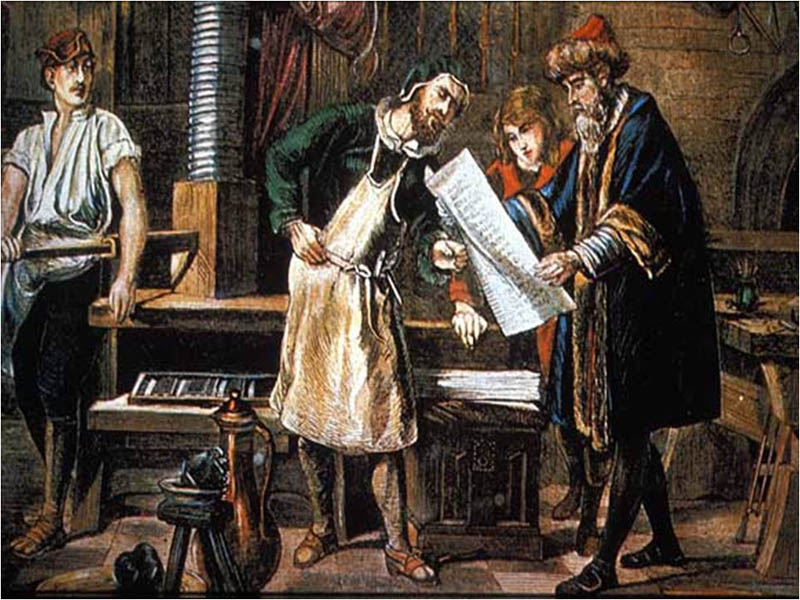
HOW ENGLAND WAS AGAIN
REFORMED.
A FEW weeks ago it was shown how the people of England were for many hundred years unable to obtain the Bible to read themselves, and so depended on their priests and bishops for religious instruction; and how they were taught by these men to believe and do many things that were forbidden in God's Word. But the good Father will not suffer his children always to remain ignorant of his will; and in the year 1324, in Yorkshire, was born a man, named John Wycliffe (also spelled Wickliffe), who was destined to act an important part in undeceiving the people. This man won great distinction on account of his superior ability and learning, and held high offices in the church. But he feared God more than man, and was not afraid to preach against the wrong practices of the church, and to denounce the doctrines, which he thought were false. While this made him many friends among the common people, his brother bishops and priests were exceedingly bitter toward him. He was pronounced a heretic by the pope, and deprived of some of his offices; and many were the plots laid to shed his blood. But partly by the aid of certain influential men in the kingdom, and partly because the minds of his enemies were diverted by divisions in the church, he was permitted to meet a peaceful death. Over forty years afterward, however, his bones were hunted out, burned, and their ashes thrown into a brook.
But the greatest good, which this man did to his countrymen, is yet to be mentioned. With the aid of his pupils and friends, he translated the entire Bible into the English tongue, and had copies of the translation made with pen and ink. From these, certain poor priests, who had received his instruction and had great respect for his learning and piety, read to the people when they taught them. These priests also distributed to the people copies of tracts written by Wycliffe, in which he exposed many of the errors of the church. Though at the time his bones were given to the flames, an effort was made to collect and burn his writings, and about two hundred of his works so perished, yet the seed sown by his efforts could not be destroyed, but ripened into fruit, which afterward did much toward the overthrow of the Romish power. His followers, whom the people called "Lollards," were after his death persecuted very cruelly, and many of them left England.
Two hundred years afterward, Henry VIII., king of England, renounced the; authority of the pope, and assumed the title of "supreme head of the Church of England," all because the "holy father" had refused to grant a certain request he had made. Thus he virtually became pope of England, while he and his subjects still remained Catholics. Yet his defiance of the pope set the people to thinking, and revived many of the teachings of Wycliffe and the Lollards. About this time, two men, William Tyndale and Miles Coverdale, availed themselves of the printing art, which was just coming into use, and printed some copies of the Bible, which they had translated. At first the people were forbidden to buy or read them, and Mr. Tyndale was condemned as a heretic, and burned at the stake in Belgium, whither he had fled. But the king afterward permitted Mr. Coverdale to print them openly, and ordered a copy to be placed in every church. The continual reading to the people from the Bible, showed them more and more plainly how they had been deceived; and although the king and many of his officers were wicked men, and those who did not believe and obey what was taught by this new church, were persecuted just as cruelly as before, still the Reformation in England was begun. The power of the pope over the minds of the people was broken, they were given the word of God for their own study, and a flame was kindled in their breasts, which was not to be quenched until liberty of conscience should be granted to every son of
British soil.
During the reign of Henry's successor, Edward VI., the Reformation made some further progress under the labors of three noted men, named Cranmer, Ridley, and Latimer. But upon the death of Edward, a bitter Roman Catholic, named Mary, became queen of England; and then began that period known as the "Bloody Reign of Queen Mary." Although she promised, upon coming to the throne, to carry on the reform begun by her predecessors, yet when she became fully established, she took every measure in her power to restore the authority of the pope. Hundreds were made to feel her vengeance for having taught contrary to the Church of Rome, and the history of the Marian martyrs is a dark stain on the page of history. At another time you will be told more of this cruel woman whose life was a curse, and whose death was a blessing to all mankind.
C. H. G.